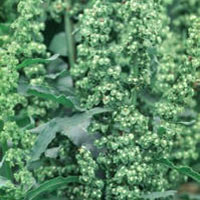Yellow Dock
Uses
Parts Used & Where Grown
Yellow dock is found in many places throughout North America. The root of the plant is used in herbal medicine.
Our proprietary “Star-Rating” system was developed to help you easily understand the amount of scientific support behind each supplement in relation to a specific health condition. While there is no way to predict whether a vitamin, mineral, or herb will successfully treat or prevent associated health conditions, our unique ratings tell you how well these supplements are understood by the medical community, and whether studies have found them to be effective for other people.
For over a decade, our team has combed through thousands of research articles published in reputable journals. To help you make educated decisions, and to better understand controversial or confusing supplements, our medical experts have digested the science into these three easy-to-follow ratings. We hope this provides you with a helpful resource to make informed decisions towards your health and well-being.
3 StarsReliable and relatively consistent scientific data showing a substantial health benefit.
2 StarsContradictory, insufficient, or preliminary studies suggesting a health benefit or minimal health benefit.
1 StarFor an herb, supported by traditional use but minimal or no scientific evidence. For a supplement, little scientific support.
This supplement has been used in connection with the following health conditions:
| Used for | Why |
|---|---|
1 Star Indigestion, Heartburn, and Low Stomach Acidity Refer to label instructions | Yellow dock is a digestive stimulant widely used in traditional medicine in North America. Bitter herbs are thought to stimulate digestive function by increasing saliva production and promoting both stomach acid and digestive enzyme production. As a result, they are particularly used when there is low stomach acid but not in heartburn (where too much stomach acid could initially exacerbate the situation). These herbs literally taste bitter. Some examples of bitter herbs include greater celandine, wormwood, gentian,dandelion, blessed thistle, yarrow, devil’s claw, bitter orange, bitter melon, juniper, andrographis, prickly ash, and centaury.. Bitters are generally taken either by mixing 1–3 ml tincture into water and sipping slowly 10–30 minutes before eating, or by making tea, which is also sipped slowly before eating. Some bitters widely used in traditional medicine in North America include yarrow, , goldenseal, Oregon grape, and vervain. Oregon grape’s European cousin barberry has also traditionally been used as a bitter. Animal studies indicate that yarrow, barberry, and Oregon grape, in addition to stimulating digestion like other bitters, may relieve spasms in the intestinal tract. |
Traditional Use (May Not Be Supported by Scientific Studies)
Yellow dock has a long history of use as an alterative. Alterative herbs have nonspecific effects on the gastrointestinal tract and the liver. As a result, they are thought to treat skin conditions attributed to toxic metabolites from poor digestion and poor liver function.
How It Works
How It Works
Yellow dock contains relatively small amounts of anthraquinone glycosides, which may contribute to its mild laxative effect.1 It is also thought to stimulate bile production. It is often used as a digestive bitter for people with poor digestion. No human studies have been done on its use as medicine.
How to Use It
A tincture of yellow dock, 1/4–1/2 teaspoon (1–2 ml) three times per day, can be used.2 Alternatively, a tea can be made by boiling 1–2 teaspoons (5–10 grams) of root in 2 cups (500 ml) of water for ten minutes. Three cups (750 ml) may be drunk each day.
Interactions
Interactions with Supplements, Foods, & Other Compounds
Interactions with Medicines
Side Effects
Side Effects
Aside from mild diarrhea or loose stools in some people, yellow dock is rarely associated with side effects.3
References
1. Hoffman D. The Herbal Handbook: A User's Guide to Medical Herbalism. Rochester, VT: Healing Arts Press, 1988, 40.
2. Newall CA, Anderson LA, Phillipson JD. Herbal Medicines: A Guide for Health-Care Professionals. London: Pharmaceutical Press, 1996, 274.
3. Newall CA, Anderson LA, Phillipson JD. Herbal Medicines: A Guide for Health-Care Professionals. London: Pharmaceutical Press, 1996, 274.
Last Review: 06-03-2015

Copyright © 2024 TraceGains, Inc. All rights reserved.
Learn more about TraceGains, the company.
The information presented by TraceGains is for informational purposes only. It is based on scientific studies (human, animal, or in vitro), clinical experience, or traditional usage as cited in each article. The results reported may not necessarily occur in all individuals. For many of the conditions discussed, treatment with prescription or over the counter medication is also available. Consult your doctor, practitioner, and/or pharmacist for any health problem and before using any supplements or before making any changes in prescribed medications. Information expires December 2024.
This information does not replace the advice of a doctor. Healthwise, Incorporated, disclaims any warranty or liability for your use of this information. Your use of this information means that you agree to the Terms of Use. Learn how we develop our content.

